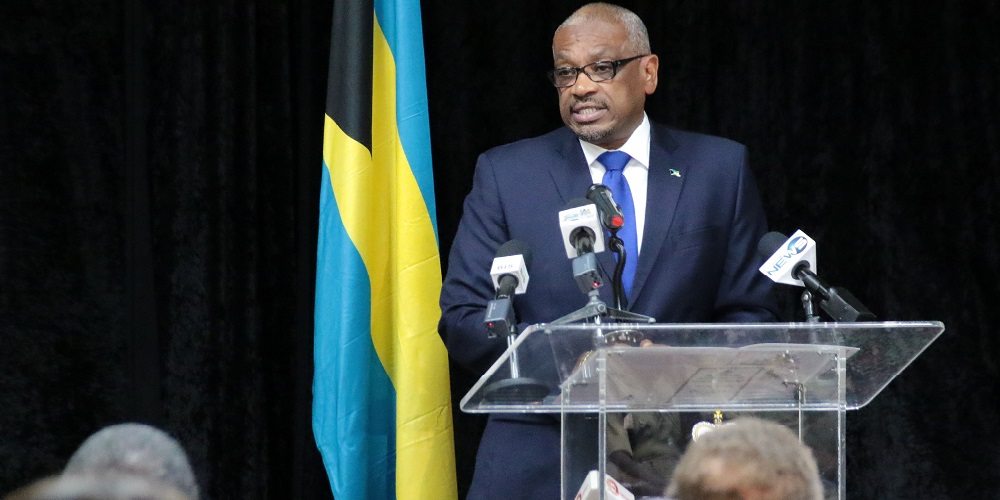#Bahamas, April 25, 2018 – Nassau –
- Cabinet Colleagues
- Speaker and Members of the House of Assembly
- Madam President and Senators
- Secretary to the Cabinet
- Commissioner of Police
- Commodore of Defence Force
- Senior Public Officials
Good morning:
I thank the Government of Jamaica for approving our request for Mr. Damian Cox, Chief Technical Officer in Office of the Prime Minister, to conduct workshops on the Freedom of Information Act, 2017, as we seek to fully implement the Act.
Mr. Cox: Welcome to the Bahamas.
Mr. Cox was involved in the implementation of Jamaica’s Access to Information Act, which is equivalent to our Freedom of Information Act.
We are pleased to have him with us to discuss the experience of Jamaica in implementing the Freedom of Information Act here in the Bahamas.
I recently signed the Appointed Day Notice, which brought into effect the whistleblower provision under section 47 of the Act.
The Freedom of Information Act will be brought into effect in phases, in order to ensure that all the preparatory work, and training, that is necessary to fully implement the regime is in place.
This will better ensure the effectiveness of the regime.
Freedom of information or the right to access information is considered an essential component of a modern democracy.

The Model Inter-American Law on Access to Public Information states in its preamble that:
“- the Inter-American Court of Human Rights … formally recognized the right of access to information as part of the fundamental right to freedom of expression;
– that access to information is a fundamental human right and an essential condition for all democratic societies; and
– that the right of access to information is based on the principle of maximum disclosure.”
The Act is intended to ensure general public access to government information.
There are a number of safeguards for the protection of an individual’s sensitive personal data.
The Act ensures the protection of national security matters, legal privilege and certain government communications.
With the exception of these carve outs or exemptions, the Act provides the public wide access to records.
It is crucial to take note of the objects of the Freedom of Information Act, 2017, which are outlined in section four.
The objects of the Act are to reinforce and give further effect to certain fundamental principles underlying the system of constitutional democracy, namely:
(a) governmental accountability;
(b) transparency; and
(c) public participation in national decision making, by granting to the public a general right of access to records held by a public authority.
Access to records will be subject to exemptions which balance the right of access, and non-disclosure of governmental or commercial information in the public interest.

To properly implement the freedom of information regime, each public authority to which the Act relates, must have information managers to facilitate the requests for records and the granting of access to records.
These information managers will be required to undergo special training.
Each public authority, in consultation with the Information Commissioner, must ensure that training is provided for its officials regarding the right to information, and the effective implementation of the provisions of this Act, as provided in section 51.
The Act also provides for the appointment of an individual, whose independence and sterling character, are crucial to the working of this regime.
This person is the Information Commissioner, who pursuant to section 30 of the Act, shall be appointed by the Governor-General upon the recommendation of the Prime Minister, after consultation with the Leader of the Opposition.
It is crucial to note that the Information Commissioner will have the overall responsibility for the freedom of information regime.
The Commissioner will be required to monitor public authorities to ensure that they are complying with the Act.
The Information Commissioner will establish a Freedom of Information Unit with its own staff, which will include one or more Deputy Information Commissioners, and Assistant Information Commissioners.
The Information Commissioner will enjoy independence, and autonomy, in operating and administering the Freedom of Information Unit.
In order to ensure the Information Commissioner’s independence, the Act provides that the Commissioner will be a corporation sole and that he or she must—
(a) be a fit and proper person appropriately qualified for appointment;
(b) be independent, impartial and accountable; and
(c) have demonstrable knowledge in access to information … or public and corporate governance.
If an individual, group or entity is not satisfied with a decision of a public authority, the Act provides for various levels of appeal up to the Supreme Court. Does this mean: is not satisfied with the Information Commissioner and/or a government agency?
Ladies and Gentlemen:
I am pleased that we are beginning the full training and implementation phase of the Freedom of Information regime.
We look forward to meaningful and productive workshops, with the public sector and civil society groups over the next several days.
Thank you for your kind attention. Good morning.


 News3 days ago
News3 days ago
 News1 week ago
News1 week ago
 Caribbean News4 days ago
Caribbean News4 days ago
 News3 days ago
News3 days ago













